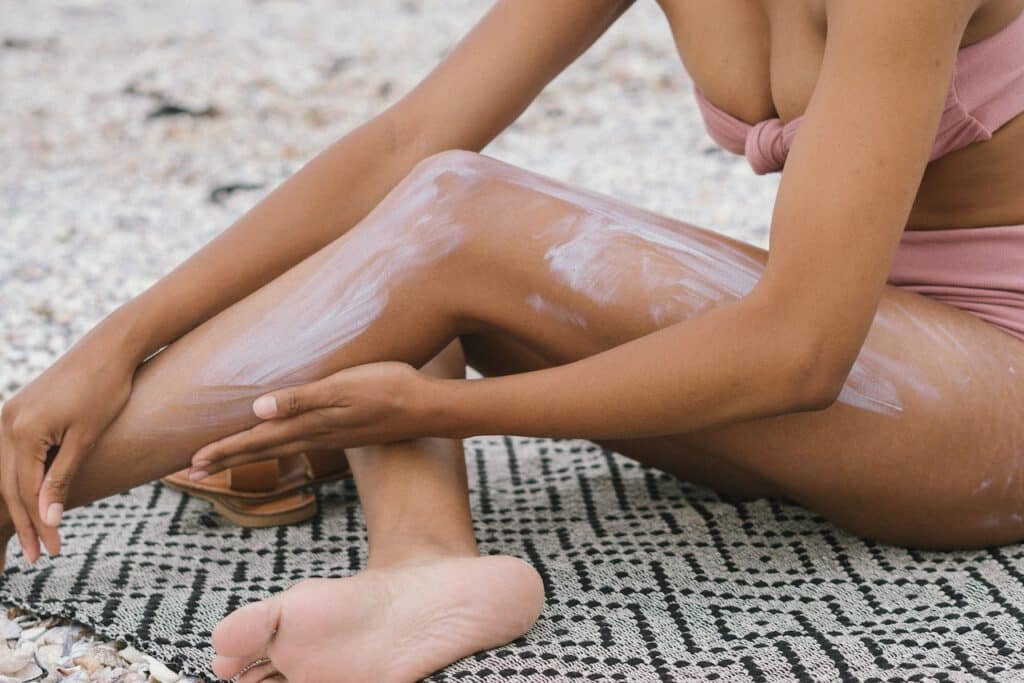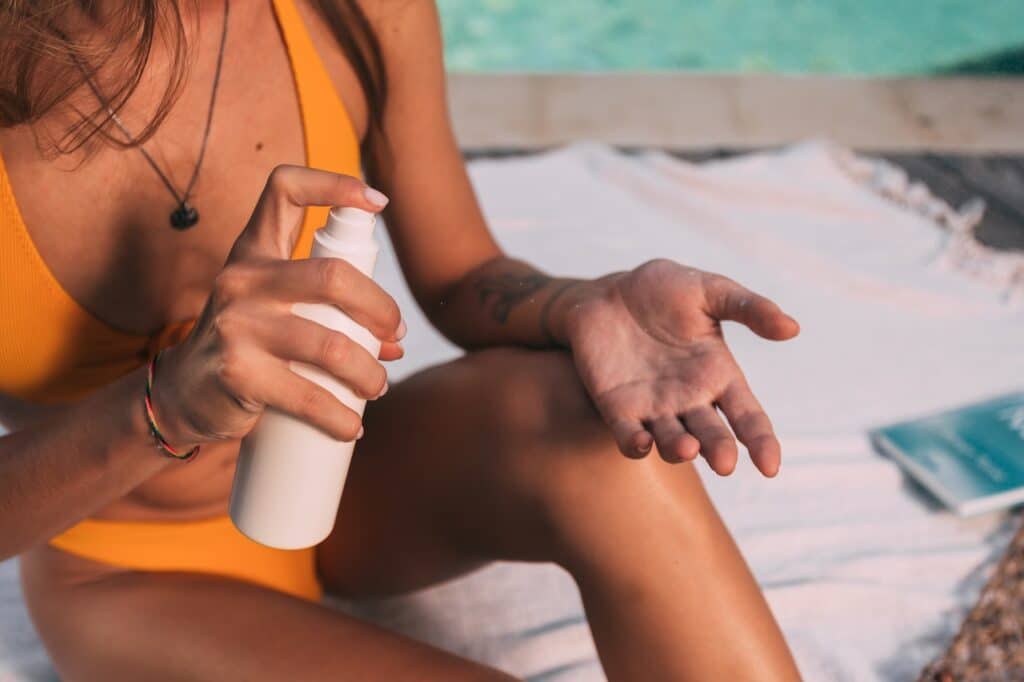Sunscreen lawsuits are currently seeking compensation for people who used sun care products produced by companies like Neutrogena, Aveeno, and Johnson & Johnson. These sunscreen products have faced scrutiny due to benzene contamination. According to the World Health Organization, benzene exposure can lead to certain blood cancers, including chronic lymphocytic leukemia and acute myeloid leukemia.
Why are People Filing Sunscreen Lawsuits?
People are filing sunscreen lawsuits against companies like Johnson & Johnson, Neutrogena, and Aveeno due to benzene contamination in their sun care products. According to The World Health Organization’s International Agency for Research on Cancer, benzene is a carcinogen that can increase the risks of developing certain cancers.
Despite promoting their sunscreen products as safe, Johnson & Johnson has faced allegations that their products were “dangerous and unfit for use” due to the presence of benzene.
What is Benzene?
Benzene is a chemical found in many products, but its presence has also been detected in certain sunscreen brands. While benzene is naturally produced by natural events like forest fires, its contamination in sunscreen products has led to a number of sunscreen lawsuits.
The World Health Organization categorizes benzene as a carcinogen, with research suggesting its link to blood cancers such as acute myeloid leukemia, chronic lymphocytic leukemia, and lymphocytic leukemia. One study from 2021 indicated that benzene could promote cancer by causing chronic inflammation and weakening the immune system.
Recalled Sunscreens
In light of benzene contamination concerns, sunscreen brands including Neutrogena, Aveeno, and Johnson & Johnson issued a sunscreen recall in July 2021 for several aerosol products. This sunscreen recall prompted the Neutrogena sunscreen lawsuit and other related sunscreen lawsuits.
Sunscreen products under scrutiny include:
- Aveeno Protect + Refresh aerosol sunscreen
- Neutrogena Beach Defense aerosol sunscreen
- Neutrogena Cool Dry Sport aerosol sunscreen
- Neutrogena Invisible Daily defense aerosol sunscreen
- Neutrogena Ultra Sheer aerosol sunscreen
Even sun care products that are not part of the official sunscreen recall have been found to contain benzene, and could be central to the sunscreen lawsuits.
The companies are currently exploring how benzene ended up in their products. Despite the recall, Johnson & Johnson issued a statement saying that the benzene levels detected in their products were not expected to lead to adverse health problems.
Before the recall, Valisure, an online pharmacy, highlighted the benzene contaminated sunscreen problem by filing an FDA citizen petition. Valisure’s tests indicated that several of Johnson & Johnson’s sunscreen products contained benzene at levels surpassing the standards set by the U.S. Food and Drug Administration and the Environmental Protection Agency.
Additionally, Valisure identified other J&J sun care products with elevated benzene levels that have not been recalled, and are still available for purchase.

Banana Boat Sunscreen Recall
In 2023, Edgewell Personal Care expanded their sunscreen recall from the previous year, highlighting benzene contamination in its Banana Boat Hair & Scalp Sunscreen Spray SPF 30. While Edgewell does not normally have benzene in its sun care products, it was discovered that the propellant used to dispense the sunscreen contaminated it with benzene.
The company is offering reimbursement to customers who bought toxic products under the affected batch lot codes. These codes include:
- 20016AF
- 20084BF
- 21139AF
- 20301CF
You can find these lot codes at the base of the can. If you bought one of the affected batches, you can call Edgewell Personal Care at 1-888-686-3988 for a refund.
Does Sunscreen Cause Cancer?
According to the MD Anderson Cancer Center, sunscreen itself doesn’t cause cancer. However, contaminants like benzene in sunscreen products can elevate the risk of certain cancers. Valisure found benzene in 78 of the 300 sunscreen and after-sun products tested.
While benzene isn’t an approved sunscreen ingredient, Dr. Michael Kasper, director of radiation oncology at Lynn Cancer Institute, suggests that it could enter the product through contamination or as a byproduct of other ingredients, such as oxybenzone, avobenzone, and homosalate.
According to the data cited in Valisure’s citizen petition, exposure to any amount of benzene, even if minimal, poses health risks.
Can I File a Sunscreen Cancer Lawsuit?
If you or someone you know has used a Neutrogena sunscreen or related sunscreen product that contained benzene and were diagnosed with cancer, you may be eligible to file a sunscreen lawsuit.
If you’re uncertain about whether your specific cancer diagnosis aligns with a sunscreen recall lawsuit, schedule a free case evaluation with an attorney who specializes in personal injury or product liability.
Cancers linked to benzene exposure include:
- Acute myeloid leukemia
- Acute lymphocytic leukemia
- Chronic lymphocytic leukemia
- Multiple myeloma
- Non-Hodgkin lymphoma

Sunscreen Lawsuit Status
Sunscreen lawsuits are still in the early phases. No trials or verdicts have been made public to date. However, in November 2021, Johnson & Johnson did reach a provisional sunscreen settlement, the details of which remain undisclosed, as reported by CBS News.
Health problems attributed to sunscreen products, including cancer from benzene exposure, are currently being filed as individual sunscreen cancer lawsuits. However, given the potential volume of sunscreen recall lawsuits, these could be streamlined into a mass tort or multidistrict litigation (MDL). Meanwhile, some consumers are launching class action lawsuits to recoup the cost of purchasing Johnson and Johnson’s recalled sunscreen products.
Unlike class action lawsuits, individual injury lawsuits are handled separately, with plaintiffs hiring their own legal representation.
To participate in a class action lawsuit or file an individual lawsuit, you should consult with an attorney who has experience in sunscreen lawsuits. Filing before the statute of limitations ends is crucial, so it’s important to act quickly to protect your eligibility for filing.
Consumers seeking refunds for recalled sunscreen products can contact the Johnson & Johnson Consumer Care Center at 1-800-458-1673. If you’re wanting to file a lawsuit and apply for a refund and a lawsuit, avoid signing any release of liability waivers.
References
- https://aboutlawsuits-wpengine.netdna-ssl.com/wp-content/uploads/2021-8-2-sunscreen-fernandez-complaint.pdf
- https://baptisthealth.net/baptist-health-news/cancer-causing-chemicals-in-sunscreens-what-you-need-to-know/
- https://www.cancer.org/cancer/cancer-causes/benzene.html
- https://emergency.cdc.gov/agent/benzene/basics/facts.asp
- https://www.fda.gov/safety/recalls-market-withdrawals-safety-alerts/edgewell-personal-care-issues-voluntary-nationwide-recall-banana-boat-hair-scalp-sunscreen-due-0
- https://www.jnj.com/johnson-johnson-consumer-inc-issues-voluntary-recall-of-specific-neutrogena-and-aveeno-aerosol-sunscreen-products-due-to-the-presence-of-benzene
- https://www.mdanderson.org/publications/focused-on-health/6-sunscreen-myths-debunked.h26-1592202.html
- https://oem.bmj.com/content/78/5/377
- https://www.reuters.com/business/healthcare-pharmaceuticals/jj-costco-settle-lawsuits-over-recalled-sunscreen-2021-11-01/
- https://www.valisure.com/wp-content/uploads/Valisure-Citizen-Petition-on-Benzene-in-Sunscreen-and-After-sun-Care-Products-v9.7.pdf
